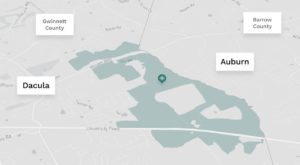By Brian Brodrick
LAWRENCEVILLE, Ga. | A team of researchers from the University of Georgia’s College of Environment and Design spent months earlier this year combing the nearly 2,000 acres in rural Gwinnett County that is the future site of Rowen, slated to become one of the nation’s premier innovation communities over the next few decades.
The resulting study, called the “Rowen Historical and Cultural Report,” was written by Dr. Mark Reinberger and Prof. Dan Nadenicek, and is shared by the Rowen Foundation. The report will help ensure that the Foundation, which manages the project, will carefully honor the history of the site as it plans its future.
Mason Ailstock, president of the Rowen Foundation,says: “As stewards of Rowen, we take our responsibility seriously to honor and preserve as many of the site’s historic assets as possible. We are grateful to the College of Environment and Design for providing this detailed resource as we plan Rowen.”
Rowen will be a knowledge community that operates at the intersection of business, innovation and research. The Rowen Foundation engaged the College of Environment and Design to honor two of the community’s core values, stewardship and sustainability, while providing a full picture of the site’s significance to Georgia history as planning began for the project.
The report also allows the Foundation to understand the evolution and impact of Rowen’s programmatic drivers – agriculture, medicine and the environment – on the land over past generations.
The report’s research and recommendations will be used to preserve, enhance, and celebrate the site’s historical and cultural features. These include historic sites, remnants of past historic structures, remains of an historic mill, two historic homes, and landscape features that includes one of Gwinnett’s oldest dirt roads.
The report’s findings have also been layered into a multi-faceted analysis of the site – including sensitive environmental areas, tree canopy, waterways and others – that inform intensity, density, roadway design and areas of the site that may or may not be developed over the project’s more than 50 year buildout.
The collaboration was also one of the first formal partnerships between Rowen and University System of Georgia researchers. A key goal for the Rowen Foundation is to be a vehicle for collaboration and innovation between academics and the community.
Rowen is working in close coordination with Gwinnett County to explore the recommendations outlined in UGA’s report.
Tina Fleming, director of the Gwinnett County Department of Community Services,says:
“The Rowen report provides valuable insights into the history of the Rowen lands. Gwinnett County looks forward to partnering with the Rowen Foundation in identifying and celebrating valuable community assets at the site.”
Additional findings from the report emphasize the importance of existing structures and environmental points of interest such as connection to the Apalachee River and natural walking trails. With the report’s recommendations for the careful management of the historical features of the site, the Rowen Foundation hopes to honor the legacy of this land, which is deeply embedded in Gwinnett County already.
Reinberger and Nadenicek worked with three graduate students from the college to conduct the research. The team was joined by Dacula native Caroline Hinton and utilized resources from the Gwinnett County Historical Society.
- The report can be viewed on Rowen’s website at https://www.rowenlife.com/announcement/historicalculturalreport/.
- Have a comment? Send to: elliott@brack.net










Follow Us